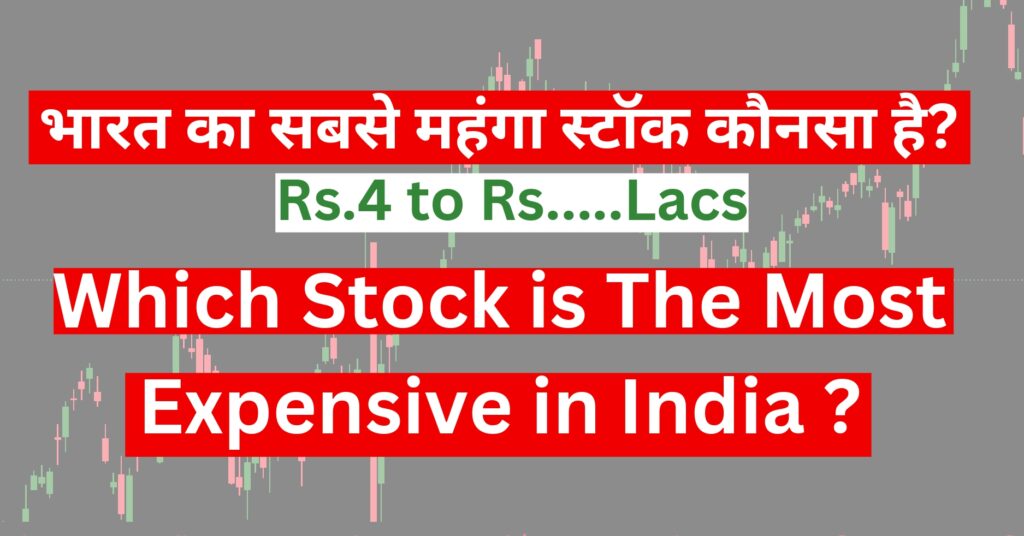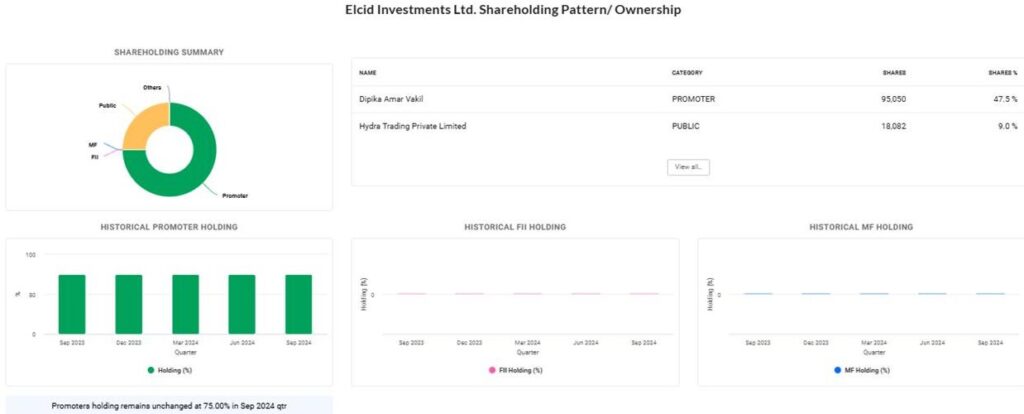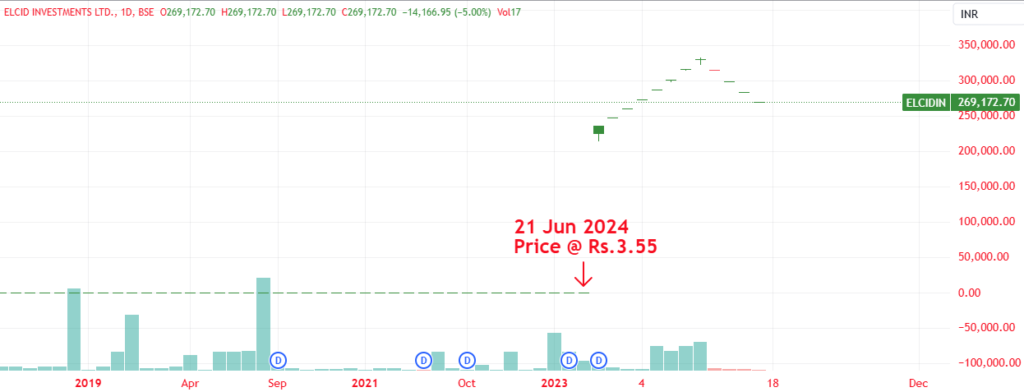
Which stock is the Most Expensive Stock in India ? This company is one of the most fascinating companies in India’s financial sector. Established on December 3, 1981, Its a non-banking financial company (NBFC) and an investment firm registered with the Reserve Bank of India (RBI). The company’s primary focus is managing a diverse investment portfolio, generating income through its various holdings in different companies. Most Expensive Stock in India name is Elcid Investments Limited.
As of March 31, 2024, Elcid operates with two wholly owned subsidiaries: Murahar Investments & Trading Company Limited and Suptaswar Investments & Trading Company Limited. These subsidiaries hold significant equity stakes in several prominent companies, adding substantial value to Elcid’s overall portfolio. However, its major source of income continues to be its investments, which expose it to the volatility of the Indian and global capital markets.
Also Read : How to Pick Good Stocks
Key Highlights of Most Expensive Stock in India : Elcid Investments
Elcid’s investment portfolio has been central to its success, particularly its significant stake in Asian Paints, one of India’s most valuable and well-known companies. As of December 2022, Elcid holds a 4.2% stake in Asian Paints, which was valued at approximately ₹12,664 crore. Additionally, its subsidiaries, Murahar Investments and Suptaswar Investments, own 0.60% and 0.68%, respectively, of Asian Paints.

The Promoters Behind Most Expensive Stock in India : Elcid Investments
The company is led by the Vakil family, with Arvind Vakil as the head of the family. Arvind Vakil is one of the co-founders of Asian Paints, which was established in 1942. Elcid’s long-standing relationship with Asian Paints, through its ownership stake, strengthens its position as a promoter entity within the company. As of 2024, Elcid owns about 2.95% of Asian Paints, valued at nearly ₹8,400 crore. This relationship continues to play a vital role in shaping Elcid’s investment strategy and overall value.
Some Key Financials of the Most Expensive Stock in India : Elcid Investments Given Below :
| Market Cap | ₹ 5,383 Cr. |
| Stock P/E | 22.3 |
| Debt to equity | 0.00 |
| Pledged percentage | 0.00 |
| ROCE | 2.02 % |
| ROE | 1.53 % |
| Current Price | ₹ 2,69,173 (16.11.2024) |
The Challenges of De-Listing and Corporate Restructuring of the Most Expensive Stock in India
Elcid Investments has faced several challenges in restructuring its operations, particularly with regard to its attempts to delist from the stock exchanges. In 2013, the promoters of Elcid made an attempt to buy back 20% of the company’s shares from minority shareholders for ₹11,455 per share, aiming to delist the company. Unfortunately, the attempt failed as not enough shares were tendered by the minority shareholders to meet the required threshold.
In a subsequent attempt in March 2022, the promoters offered ₹1,61,023 per share to buy out minority shareholders in an effort to delist the company. However, this move also fell short, highlighting the challenges Elcid faced in aligning its ownership structure with its investment-driven business model.
Open Offer for Compliance with SEBI Regulations
After the failed delisting attempts, Elcid’s promoters were required to comply with regulations set by the Securities and Exchange Board of India (SEBI). According to SEBI’s guidelines, promoters of listed companies cannot hold more than 75% of the company’s shares. At the time, the Vakil family controlled about 80% of Elcid’s shares, prompting the company to make an open offer to minority shareholders.
In response, the promoters offered to purchase 4.75% of the company for 9,500 shares from minority shareholders at a price of ₹5,000 per share. The offer was fully subscribed, ensuring compliance with SEBI’s regulations and allowing the company to reduce its promoter holding to below the 75% threshold.

Efforts Towards Price Discovery
Elcid Investments’ stock price has long been a subject of intrigue due to the significant but somewhat opaque value of its investments, particularly in Asian Paints. Despite low trading volumes, the company’s intrinsic value was much higher than its trading price of around ₹15 per share. This discrepancy led to concerns about the fair market value of Elcid’s stock.
In 2020,several stakeholders petitioned the Bombay High Court to address this issue and implement a more transparent and accurate method for price discovery. Following these appeals, the SEBI introduced a special call auction system designed to allow for free price movement and true market discovery, unencumbered by artificial price bands.
The Dramatic Surge in Elcid’s Share Price
The price discovery process for Elcid Investments reached a historic climax in October 2024. On October 28, 2024, after the implementation of the special call auction, Elcid’s stock price soared to an astonishing ₹2,36,250 per share, representing an astronomical increase of 7.03 million percent from its previous price of ₹3.53 in June 2024. This meteoric rise propelled Elcid Investments to become the most expensive stock in India in terms of absolute value, surpassing the stock price of other high-profile companies like MRF.
Shareholding Structure and Public Participation of the Most Expensive Stock in India : Elcid Investments
As of September 30, 2024, Elcid had a total of 200,000 outstanding equity shares. Of these, 75% (150,000 shares) were held by the promoters, while the remaining 25% (50,000 shares) were in public hands. Among the public shareholders, significant holdings were made by entities such as Hydra Trading Pvt Ltd, with 18,082 shares, and 3a Capital Services Ltd, which owns 6,682 shares. Additionally, 284 resident individuals collectively held 14,857 shares.
Conclusion of the Most Expensive Stock in India : Elcid’s Place in the Indian Financial Landscape
The story of Elcid Investments is a compelling tale of how a company, with a strong portfolio of investments, faced challenges in terms of market transparency, delisting efforts, and regulatory compliance, but ultimately became the most expensive stock in India.
With its valuable stake in Asian Paints and a unique path to price discovery, Elcid has set a remarkable precedent in the Indian financial world. The company’s shares, which were once priced modestly, have now become emblematic of the complexities and unpredictabilities of the stock market, especially in the case of investment holding companies with large but sometimes misunderstood portfolios.
As Elcid continues to evolve, its journey remains a key point of interest for investors, regulators, and market analysts alike, illustrating both the potential and the risks of holding companies in India’s dynamic financial markets.
Read more on Elcid Investments
